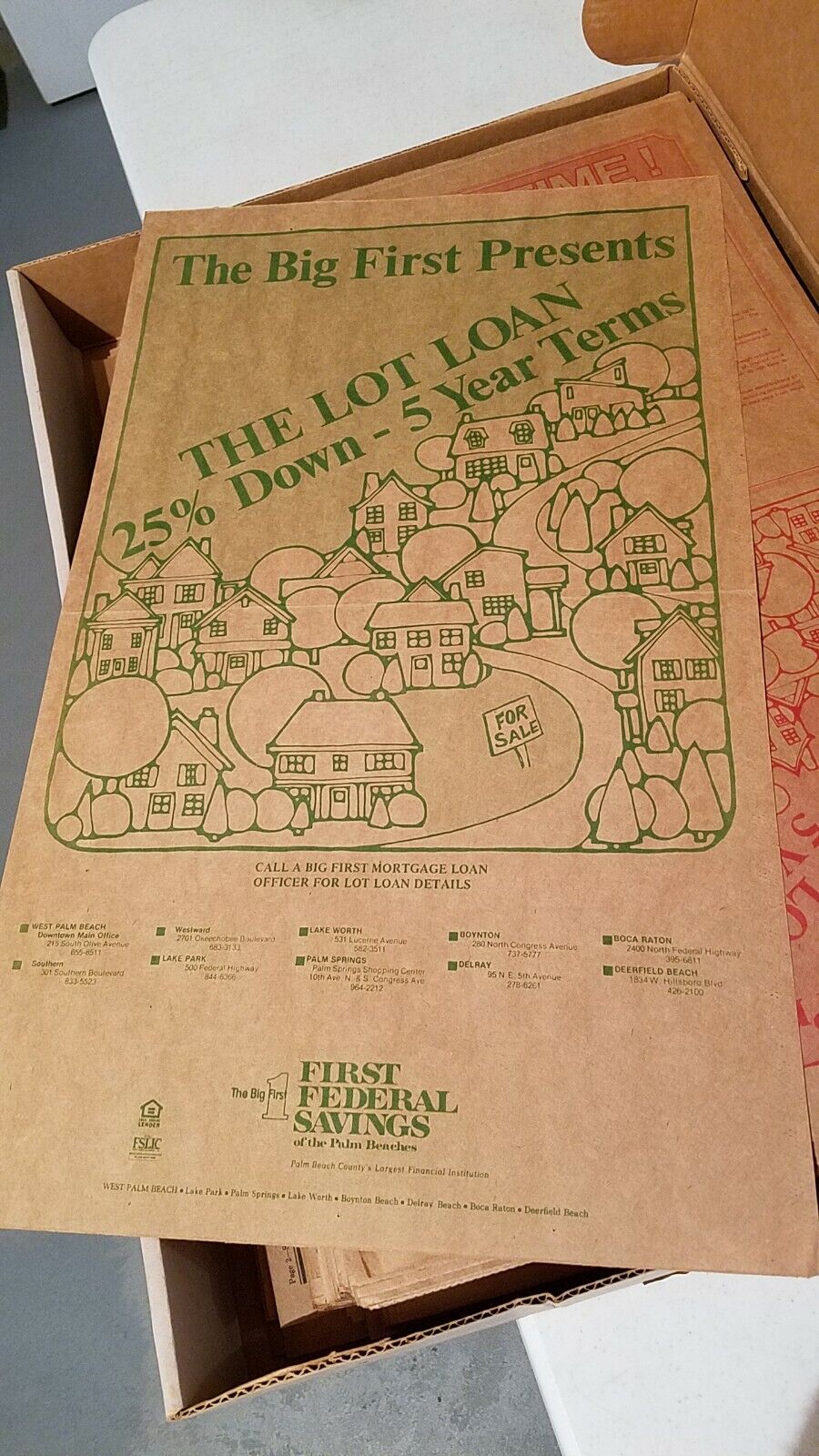Palm Beach Post Newspaper - The Brown Wrapper Sunday Insert - Judge James Knott

When you click on links to various merchants on this site and make a purchase, this can result in this site earning a commission. Affiliate programs and affiliations include, but are not limited to, the eBay Partner Network.
Palm Beach Post Newspaper - The Brown Wrapper Sunday Insert - Judge James Knott:
$49.00
The Sunday Brown Wrapper - Complete CollectionThe Palm Beach Post Newspaper
Beginning in 1977, through June 1985, the \"Brown Wrapper\" series was created by First Federal Savings of the Palm Beaches as an advertising piece. Each Sunday, the \"Brown Wrapper\" would feature an historical story by Judge James Knott. The \"Brown Wrapper\" received several awards.
This covers 8+ years of publication. (Photo 3 shows 3\" of brown wrappers.)
Thanks for looking.
Here\'s some information on \"The Brown Wrapper\" and Judge James R. Knott...
For eight years, longtime residents and newcomers alike awaited the ‘Brown Wrapper” each Sunday morning. The chocolate-colored, thick-paper broadsheet that enveloped their newspapers brought lively facts and tales of local history to their breakfast tables.
The man behind the “Brown Wrapper,” retired Palm Beach County Circuit Judge James Robert Knott, was a living link between late 20th-century Florida and the state’s frontier roots.
Judge Knott died three days short of his 89th birthday. “Judge Knott was a remarkable individual who not only loved Florida history but contributed to it,” said Nick Wynne, executive director of the Florida Historical Society, one of several historical groups of which Judge Knott was an officer.
Besides his weekly dispatches, Judge Knott helped establish two museums and successfully advocated to restore the name of Cape Canaveral.
Judge Knott was born in Tallahassee on Jan. 8, 1910. His grandfather was a volunteer in the Second Seminole War, which raged from 1835 to 1842.His father, William Valentine Knott, was the state’s auditor, comptroller and treasurer. He defeated fiery Panhandle preacher Sidney Catts in the 1916 Democratic primary for governor, but Catts then ran as the Prohibition Party candidate in a bitter general election and won.
Judge Knott received a law degree from the University of Florida in 1934. He left his Jacksonville law practice to serve in the U.S. Navy in World War II. In 1946 he took a job at a West Palm Beach law firm. He was appointed to the bench in June 1956 to replace Circuit Judge Curtis E. Chillingworth – who, along with his wife, was slain in what is still considered one of Palm Beach County’s most sensational murder cases.
Judge Knott was reelected to successive terms without opposition, serving almost 21 years, the last eight of them as senior judge. He retired in 1977 and returned to private practice. Through it all, Judge Knott continued to work on his other love. “All I want to do is practice law and write local history; that suits me fine,” he said in a 1994 interview. “The history of a place is the history of the people who lived there.”
Judge Knott, who lived in West Palm Beach, was an officer of the Florida, Southern Florida and Palm Beach County historical societies and several local societies, as well as numerous preservation groups. He helped establish the Henry Morrison Flagler Museum at Flagler’s Whitehall mansion in Palm Beach and the Knott House Museum at his family home in Tallahassee. He also supported the proposed restoration of the old Palm Beach County Courthouse to convert it to a historical museum.
In 1977, Judge Knott began the weekly “Brown Wrappers” in The Palm Beach Post-Times. They continued until 1985 and led to two book-length collections. “I was amazed to find that everybody read them, and looked forward to them, and sometimes it was the only thing they read in the whole paper,” Judge Knott said in 1994.
“One of Judge Knott’s great talents was making history approachable and popularizing it,” Clemmer Mayhew III, archivist for the Historical Society of Palm Beach County, said Tuesday of Judge Knott and the Brown Wrappers. Judge Knott, along with Everglades champion Marjory Stoneman Douglas, who died last year, also led a 10-year battle to restore the historical name of Cape Canaveral, which had been renamed Cape Kennedy after the president was assassinated. They argued that Cape Canaveral dated back to the early 1500s and was one of the oldest place names in North America.
Judge Knott also had left 22 boxes of manuscripts, letters, documents and photographs to the county historical society. In 1989 the society established an achievement award in his name, its highest honor. His wife since 1942, Evelyn Douglas Causey, died in 1995. He is survived by his daughter, Elizabeth Martin of Hypoluxo, and son, James Douglas Knott of Los Angeles.
Staff writer Ava Van de Water contributed to this story.
Judge James Robert Knott ... Born: Jan. 8, 1910, in Tallahassee. Died Tuesday in Atlantis.Professional: Law degree, University of Florida. Lawyer since 1934. Palm Beach County Circuit judge, 1956-1977.
Historical: President, Historical Society of Palm Beach County, 1957-1969. President, Florida Historical Society, 1964-1966. Past vice president, Historical Association of Southern Florida. Member of several local historical societies. Past president, Preservation Foundation of Palm Beach. Past president, Palm Beach County Historical Commission. Co-founder of Palm Beach Landmarks Preservation Commission, Henry Morrison Flagler Museum and Knott House Museum (Tallahassee).
Sources: The Knott family and Historical Society of Palm Beach County
Palm Beach Post Newspaper - The Brown Wrapper Sunday Insert - Judge James Knott:
$49.00
